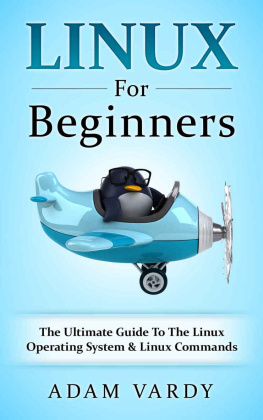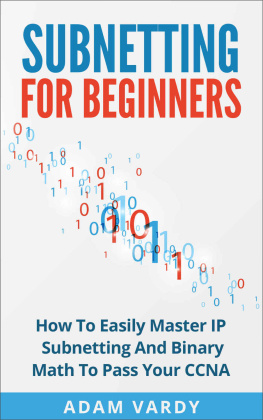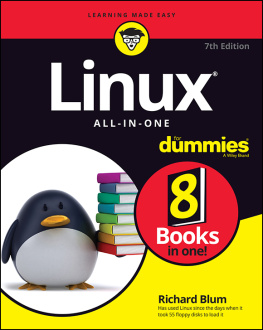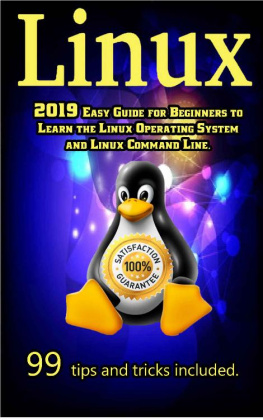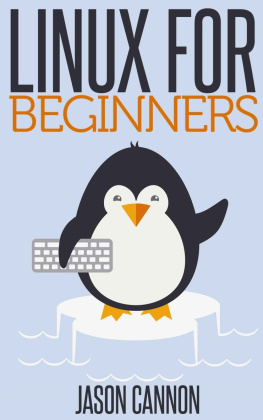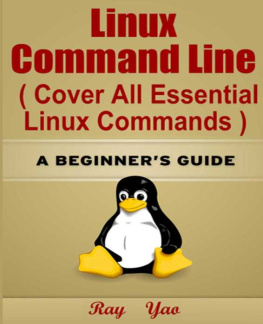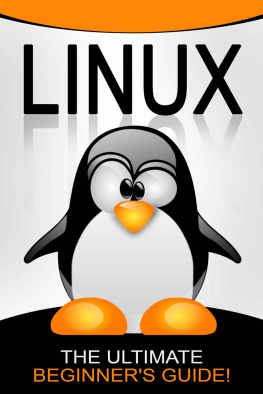Adam Vardy - Linux For Beginners: The Ultimate Guide To The Linux Operating System & Linux
Here you can read online Adam Vardy - Linux For Beginners: The Ultimate Guide To The Linux Operating System & Linux full text of the book (entire story) in english for free. Download pdf and epub, get meaning, cover and reviews about this ebook. year: 2016, genre: Romance novel. Description of the work, (preface) as well as reviews are available. Best literature library LitArk.com created for fans of good reading and offers a wide selection of genres:
Romance novel
Science fiction
Adventure
Detective
Science
History
Home and family
Prose
Art
Politics
Computer
Non-fiction
Religion
Business
Children
Humor
Choose a favorite category and find really read worthwhile books. Enjoy immersion in the world of imagination, feel the emotions of the characters or learn something new for yourself, make an fascinating discovery.
- Book:Linux For Beginners: The Ultimate Guide To The Linux Operating System & Linux
- Author:
- Genre:
- Year:2016
- Rating:4 / 5
- Favourites:Add to favourites
- Your mark:
- 80
- 1
- 2
- 3
- 4
- 5
Linux For Beginners: The Ultimate Guide To The Linux Operating System & Linux: summary, description and annotation
We offer to read an annotation, description, summary or preface (depends on what the author of the book "Linux For Beginners: The Ultimate Guide To The Linux Operating System & Linux" wrote himself). If you haven't found the necessary information about the book — write in the comments, we will try to find it.
Adam Vardy: author's other books
Who wrote Linux For Beginners: The Ultimate Guide To The Linux Operating System & Linux? Find out the surname, the name of the author of the book and a list of all author's works by series.
Linux For Beginners: The Ultimate Guide To The Linux Operating System & Linux — read online for free the complete book (whole text) full work
Below is the text of the book, divided by pages. System saving the place of the last page read, allows you to conveniently read the book "Linux For Beginners: The Ultimate Guide To The Linux Operating System & Linux" online for free, without having to search again every time where you left off. Put a bookmark, and you can go to the page where you finished reading at any time.
Font size:
Interval:
Bookmark:
Linux for Beginners
The Ultimate Guide To The Linux Operating System & Linux Commands 1 st Edition
Adam Vardy
Contents
Copyright 2016 - All rights reserved.
This document is geared towards providing exact and reliable information in regards to the topic and issue covered. The publication is sold with the idea that the publisher is not required to render accounting, officially permitted, or otherwise, qualified services. If advice is necessary, legal or professional, a practiced individual in the profession should be ordered.
- From a Declaration of Principles which was accepted and approved equally by a Committee of the American Bar Association and a Committee of Publishers and Associations.
In no way is it legal to reproduce, duplicate, or transmit any part of this document in either electronic means or in printed format. Recording of this publication is strictly prohibited and any storage of this document is not allowed unless with written permission from the publisher. All rights reserved.
The information provided herein is stated to be truthful and consistent, in that any liability, in terms of inattention or otherwise, by any usage or abuse of any policies, processes, or directions contained within is the solitary and utter responsibility of the recipient reader. Under no circumstances will any legal responsibility or blame be held against the publisher for any reparation, damages, or monetary loss due to the information herein, either directly or indirectly.
Respective authors own all copyrights not held by the publisher.
The information herein is offered for informational purposes solely, and is universal as so. The presentation of the information is without contract or any type of guarantee assurance.
The trademarks that are used are without any consent, and the publication of the trademark is without permission or backing by the trademark owner. All trademarks and brands within this book are for clarifying purposes only and are the owned by the owners themselves, not affiliated with this document.
Introduction
Thank you for buying Linux for Beginners . Linux In this book, we are going to give you an overview of the concepts that you have to understand before you actually start using Linux. We will explain to you the different elements of it that you ought to know about before you go and delve into the Linux world.
Linux has many benefits. However, it also has numerous little aspects that can leave you perplexed. Not being able to understand these aspects can definitely cause you problems in the future.
In this book, we're going to talk about what those elements are. We are also going to talk about what Linux is, where it came from, and all of the fundamental concepts that you have to understand before you actually start building your own Linux servers and maintaining your own Linux systems. In addition, we'll also teach you basic terminal commands that will get you up and running about within the Linux operating system.
We hope you enjoy this book!
Chapter 1: What is Linux?
The first thing that we need to talk about in this book is about the origins of the Linux. In a nutshell, Linux is an operating system. For those of you who do not know what an operating system is, and for all of you who think you do but may have forgotten what an operating system is, it is actually the software layer that is between your hardware and the software that allows you to get something productive done on a computer.
The operating system is what allows the software to talk to the hardware. It is the one that lets you store information on hard drives, send out print jobs to printers, etc. If you are in a normal Windows environmenta Microsoft Windows Operating systemyou have your hardware at the bottom, you have the Windows operating system on top of that, and then you have Microsoft Office, for example, that sits on top of the operating system.
Linux is an operating system that acts as an intermediaryi.e. a bridgebetween the physical device and the instructional code of a program. The main thing that you just need to realize is that in the Linux world, the software that you will be running is of a completely different type, compared to the ones that you would run in the Windows operating system. Desktop applications like Microsoft Office and Adobe Photoshop are not usually run on a Linux environment. Linux normally runs serversApache web servers, database servers, web virtualization servers, etc.
However, there are various Linux distributions out there that are specifically made for personal desktop computers. These Linux distributions are, in a way, similar to Windows and Mac OS, in a sense that they run the same types of programs like Word Processing programs, photo and video editing programs, web browsing applications, program development applications, games, etc. These Linux distributions are more targeted to home users who just want a free operating system alternative.
Linux did not begin as an operating system, however. Linux was a kernel created by Linus Torvalds while he was a student at the University of Helsinki. The Kernel is essential, but by itself, it is useless. It can only function in the context of a complete operating system. The Linux Kernel was used in combination with the GNU operating system. Imagine GNU as a big complex puzzle with a big piece in the middle missingthe big piece being the Linux Kernel. The complete puzzle equates to a functional operating system.
It is important to understand what a Kernel is as this is the defining component of Linux. A Kernel is the central part of an operating system that is responsible for interfacing all you applications down to the physical hardware.
There are two major types of Kernels competing in today's marketWindows and Unix-like Kernels. The Linux Kernel falls under the latter as does BSD, Mac OS, and Solaris. The term "Unix-like" refers to the fact that they operate similar to, or are based on the original Bell Labs UNIX operating system.
Kernels tend to fall under three categories:
- Micro Kernel A Micro Kernel only manages what it has to: CPU, Memory, and IPC or inter-process communications. If it is not an IPC, Memory, or CPU, it is automatically regarded as an accessory and can be handled in user mode.
- Monolithic Monolithic Kernels like Linux are the opposite of Micro Kernels. They encompass not only the CPU, Memory, and inter-process communications, but other things such as device drivers, file system management, and system server calls.
- Hybrid The Windows Kernel falls under Hybrid because it has the ability to pick and choose what to run in both user and supervisor mode.
And so, between 1991 and 1994, Linus Torvalds created the Linux operating system by combining the GNU OS with the Linux Kernel. Basically, Linus Torvalds wanted an operating system that is not only free, but also something that he can customize to fit according to his programming needs. Linux was his creative little pet project that he did on the side. The big thing with Linux is, because it has an "ux" suffix, and because most of the commands that you use look a lot like UNIX commands, people think that Linux is a type of UNIX operating system. This is totally not the case. UNIX is its own type of operating system. Linux is its own type of operating system.
Linus Torvalds created the entire Linux operating system from the ground up. The reason he created Linux was that he wanted to create an open source operating system for people to use. Back in the day, UNIX was not open source. If you wanted to use UNIX, you had to pay somebody in order to use UNIX. Microsoft Windows, of course, is Microsoft Windows. You always have to pay in order to use Microsoft Windows.
Font size:
Interval:
Bookmark:
Similar books «Linux For Beginners: The Ultimate Guide To The Linux Operating System & Linux»
Look at similar books to Linux For Beginners: The Ultimate Guide To The Linux Operating System & Linux. We have selected literature similar in name and meaning in the hope of providing readers with more options to find new, interesting, not yet read works.
Discussion, reviews of the book Linux For Beginners: The Ultimate Guide To The Linux Operating System & Linux and just readers' own opinions. Leave your comments, write what you think about the work, its meaning or the main characters. Specify what exactly you liked and what you didn't like, and why you think so.

